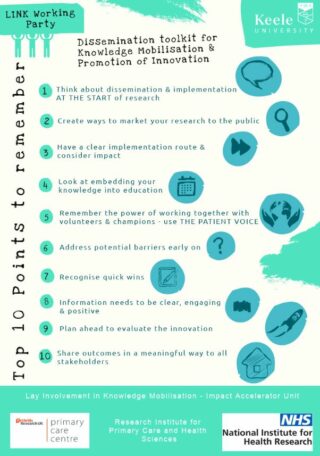Q Exchange
Peer-2-Peer Knowledge Mobilisers
- Idea
- 2018

Meet the team: QKnowledgeMobilisers
Also:
- Helen Duffy
- Laura Campbell
- LINK group members
- Carolyn Chew-Graham
What: It can take on average 17 years for research to be implemented into real world health care. At the Institute for Primary Care and Health Sciences, Keele University, we are committed to accelerating the impact of our research on improvements in care for osteoarthritis and mental health conditions. We know that those with both physical and mental health problems are much less likely to optimise self-care, are higher users of health services and are at greater risk of premature death.
Why: Many of the barriers to good care for mental health and physical health are similar; patients and health care professionals don’t prioritise such conditions and may ‘normalise’ them as part of ageing; general practitioners have limited time in routine consultations to support self-management; and core approaches to best care are complex interventions, such as physical activity. Yet long-term condition management is a substantial remit of primary care and approaches are not disease specific. Collaborative care for patients with long term conditions needs appropriate systems and pathways in place, with health care professionals and patients being aware of challenges for self-management, and with ongoing support and sign-posting.
Who: Our Impact Accelerator Unit is a collaboration between academics, health care professionals and managers, policy makers, patients and the public. The Unit benefits from a Lay Involvement in Knowledge Mobilisation (LINK) group working with patients and the public. The LINK group forms part of the Impact Accelerator Unit and draws on the 11-year track record of Patient and Public Involvement and Engagement in research in our Institute. The LINK group is a patient and public group that advises and co-produces ways by which best evidence is mobilised for the benefit of stakeholders, provides a forum for implementation issues, promotes the patient story throughout the research to implementation journey, promotes inclusivity (i.e. all ages, cultures, experience), undertakes task and finish groups in the transfer of research findings into primary care (Knowledge Mobilisation), and ensures timely sharing of information.
How: We wish to build on this LINK model to meet the challenge of crossing the boundaries between specialties in implementing NICE guidelines for osteoarthritis and depression simultaneously in primary care practice. We envisage that peer to peer knowledge mobilisation could accelerate the uptake of best care. We want to bring together the LINK group with patient organisations in primary care, arthritis and mental health to:
1) help us make sense of the evidence for patients and the public, and services, using creative innovations
2) help us support primary care in implementing good practice for patients with these conditions utilising patient insight to develop information for patients with stakeholders that can be adopted by health care services
3) collect individual success stories of Peer-2-Peer Knowledge Mobilisation
4) develop a toolkit for Peer-2-Peer Knowledge Mobilisers
We will draw on expertise in peer support from Mental Health (Mental Health Foundation peer support manual). From a pool of patient experts, we wish to develop a hub (LINK group) and spoke (representatives from patient organisations) network of Peer-2-Peer Knowledge Mobilisers. We will evaluate the impact of this new approach to accelerating impact using stories from Knowledge Mobilisers and stakeholders, and examples of co-created innovations for patients that can be adopted by health care services. We will test the model in beacon organisations in the West Midlands.
How you can contribute
- We need help in identifying key stakeholders:
- patient organisations
- champions and leaders of mental health and osteoarthritis best practice
- policy makers and providers of care for long term condition who work within the West Midlands
- national groups who would support this project.
- We would like help to reach out to hidden groups.
Further information
LINK group (PPTX, 1MB)